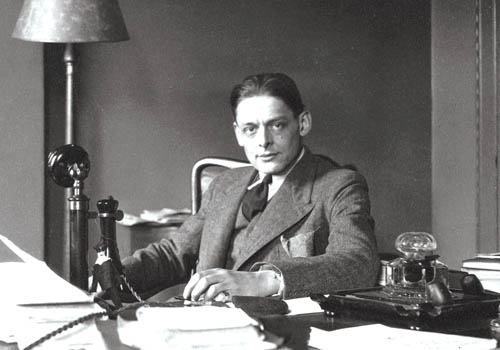The awful daring or the Eliot Way?
The Nation's James Longenbach revisits The Letters of T.S. Eliot, Vol. 1 (1898-1922) and Vol. 2 (1923-25). It seems quite an undertaking, given that many of the 800-plus pages are "boring to a degree that can hardly be borne," as he writes. But Longenbach does more than simply review, contextualizing the letters with Eliot's poetry and plays, and framing moments either with "The Eliot Way" ("a stultifying compulsion to weigh the details of everything from pajamas to the PhD") or "the awful daring": "[T]he Eliot Way is countermanded by a willed decisiveness, a determination to act that is nurtured so privately that to anyone else it appears irrational: 'the awful daring of a moment’s surrender/Which an age of prudence can never retract.'" Longenbach also finds the letters that withstand the tension:
Yet these letters are also weirdly gripping because one never knows when one might be stopped dead by a letter of singular importance, a letter in which the Eliot Way is superseded by the awful daring of a moment’s surrender:
I have made myself into a machine. I have done it deliberately—in order to endure, in order not to feel—but it has killed V…. I have deliberately killed my senses—I have deliberately died—in order to go on with the outward form of living—This I did in 1915…. But the dilemma—to kill another person by being dead, or to kill them by being alive? Is it best to make oneself a machine, and kill them by not giving nourishment, or to be alive, and kill them by wanting something that one cannot get from that person? Does it happen that two persons’ lives are absolutely hostile? Is it true that sometimes one can only live by another’s dying?… Must I kill her or kill myself? I have tried to kill myself—but only to make the machine which kills her…. Does she want to die? Can I save myself and her by recognizing that she is more important than I?
This letter, written to the critic John Middleton Murry in the spring of 1925, has already gained a kind of notoriety since it was published in England in 2009; it seems to confirm handy and longstanding notions about the poet who said in his most famous essay, “Tradition and the Individual Talent,” that poetry “is not a turning loose of emotion, but an escape from emotion.” . . .
Eliot was not literally violent, but psychic life seemed to him essentially violent; he believed that by existing he couldn’t help harming his wife, either by continuing to live with her (the Eliot Way) or by abandoning her for a new life (the awful daring). . . .
And as far as I know, the dilemma is first dramatized in “Eeldrop and Appleplex,” a curious short story Eliot published in 1917 that remains, like “A Sceptical Patrician,” the essay on Henry Adams, uncollected:
In Gopsum Street a man murders his mistress. The important fact is that for the man the act is eternal, and that for the brief space he has to live, he is already dead. He is already in a different world from ours. He has crossed the frontier. The important fact that something is done which cannot be undone—a possibility which none of us realize until we face it ourselves. For the man’s neighbors the important fact is what the man killed her with? And at precisely what time? And who found the body?… But the medieval world, insisting on the eternity of punishment, expressed something nearer the truth.
This is Eliot’s most articulate account of the moment of awful daring—the irrevocable action, in this case literally violent, that obliterates the Eliot Way. The aftermath of the action, an otherwise unavailable sense of damnation, crystallizes the actor, making him seem horrifying to himself if not to other people, who go on perceiving him through more readily available categories of knowledge. Shortly after writing “Eeldrop and Appleplex,” Eliot went on a walking tour of Southern France with Ezra Pound, and at a castle near Excideuil (as Pound would remember the incident in Canto 29) he suddenly turned to Pound and blurted, “I am afraid of the life after death,” and then, after a pause, “Now, at last, I have shocked him.”
Read the entire piece here.



